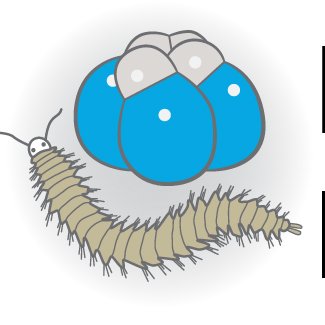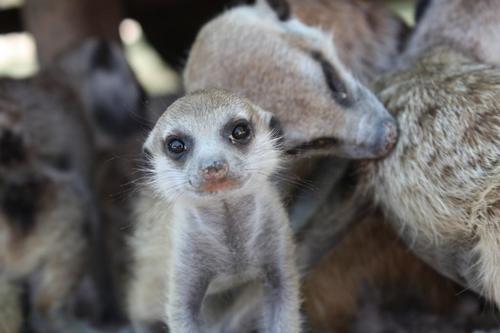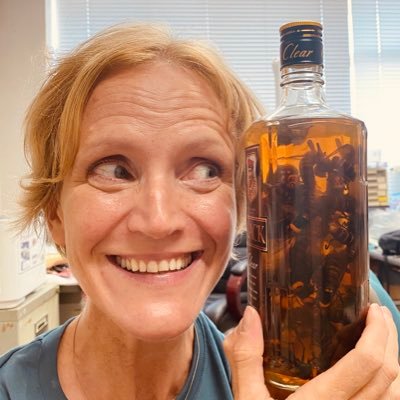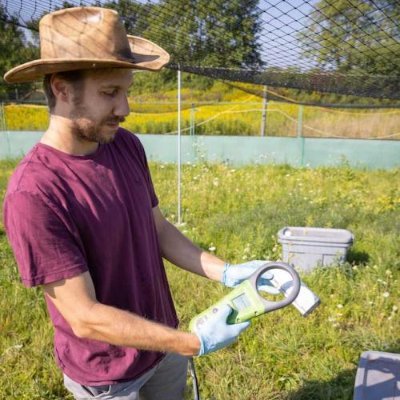
Rahia Mashoodh
@r_mashup
Followers
495
Following
5K
Media
50
Statuses
939
Senior Research Fellow @UCLCBER @CloeFor in epigenetics, inheritance, and behaviour. Lover of R, tinkering and food. Sometimes I hurt myself bicycling. 🪲🇨🇦🚲
Cambridge, UK
Joined December 2014
🚨Mark your calendars! We are launching the London EvoDevo club, a space to learn great new science, meet new colleagues and have fun! First meeting on Nov the 8th at @QMUL Register now! https://t.co/uOpn64si2A
@MargaridaMCM @deMendoza_Alex @Ferdix
2
35
74
previous thread here:
Excited to share our new paper out in @NatureComms! We used experimental evolution to understand how gene body methylation might evolve and participate in adaptive evolution. Great team effort with @PSarkies, @Jenni_Westoby & @BuryingBeetle! a 🧵: https://t.co/f68wNEVH5N
0
0
0
Super proud of this work as I think it tells us about the relationship between insect methylation, evolution and function ... but also highlights an interesting feature of parental care and its effects on phenotpyic variability via epigenetic marks!
Sarkies et al. show that changes in epigenetic modifications that evolve in burying beetles are associated with altered variability in gene expression, potentially influencing adaptation. @PSarkies
@BuryingBeetle
@r_mashup
https://t.co/lsfje8LoGI
3
9
20
6/ Our results suggest that evolved change in 5mC could contribute to phenotypic evolution by influencing variability in gene expression in invertebrates. The end. (now back to olympic memes)
1
0
2
5/ Are these changes in 5mC associated with changes in gene expression? We did not find any association between levels of gene expression and 5mC. However, we find that the accumulation of 5mC within populations is associated with reduced variability in gene expression.
1
0
2
4/ We then asked if gene body methylation (5mC) might be diverging too. We see 5mC changes in response to the loss of care (environmental) as well between populations (evolved). How does this emerge? Not sure yet, but this does not appear to be due to neighboring genetic change.
1
0
1
3/ Using RNA-seq, we show here that populations that populations that have adapted to the loss of care are able to better buffer the stress of not having parents in early-life.
1
0
1
2/ We have previously shown the genetic signatures that appear to underlie this adaptation. https://t.co/5Zfajqnmsx
Excited to see this out! @BuryingBeetle and I asked a simple question: does parental care shape genetic variation? short answer: yes Social behaviours have been long thought to drive the accumulation of genetic variation and we wanted to wanted to test this explicitly a 🧵:
1
0
1
1/ We evolved populations of the charismatic biparental burying beetle (N. vespilloides) with and without parental care. Over a short period of time these beetles adapted to a life without parental care.
1
0
1
Excited to share our new paper out in @NatureComms! We used experimental evolution to understand how gene body methylation might evolve and participate in adaptive evolution. Great team effort with @PSarkies, @Jenni_Westoby & @BuryingBeetle! a 🧵: https://t.co/f68wNEVH5N
1
23
47
📢 Global PhD opportunity: very happy to update that our advertised project on maternal behaviour and larval environment in mosquitoes is now open to applicants from *any* country and the deadline has been extended to 31 August! with @FleurPonton @pipilika_aj Dr Helena Stage
4
50
71
Exciting PhD opportunity (for UK-fee students) available in my lab and also with @FleurPonton! Please share with your networks! Open to anyone interested in insect behaviour, vector ecology and developing (evo/epi) models (i.e. experience not required, just enthusiasm to learn!).
Fully funded* PhD opportunity working with me and @FleurPonton (also Helena Stage @pipilika_aj) *UK students only (funding rules) If interested in maternal effects, mosquitoes, microbes, models -- apply!! Get to spend time both at @BristolBioSci and @mqnatsci
2
21
14
!!!JOB ALERT!!! Assistant/Associate Prof in One Health @ucl. We are looking for a fabulous new colleague @UCLCBER for our People & Nature Lab @UCLEast - deadline 10th July
nature.com
About usUCL Division of Biosciences has an outstanding international reputation, ranking joint 6th in the QS world university rankings 2024 for biolog
1
71
56
Our new paper on disentangling coadaptation in pre-hatching care behaviours between parents, using experimental evolution populations of burying beetles. Published in @royalsociety @RSocPublishing
https://t.co/TnQDnD5nKz
1
7
20
This position is now re-advertised until June 16th. Please share or apply!
We have a 2y postdoc position open in my group. The profile is quite broad, from bioinformatics to molecular biology. If you are interested in giant virus endogenization, EvoDevo, epigenetics and evolution, do apply and gent in touch. Please RT. Details: https://t.co/RXzmujXP1i
0
52
37
Three day *free* workshop in ecological statistics in Lancaster: 1-3 July https://t.co/5NiJjf9x6G
lancaster.ac.uk
1
21
26
Last day to apply for this #bioinformatics #pipelines #Nextflow job TODAY!! @UCLCBER @QMUL @SeqeraLabs
Job alert! Please share! DEADLINE: 21st May. #Bioinformatician to join our @BBSRC #BBR grant 'Building an bioinformatics ecosystem for ecologists' with @Wyatt1Chris @yannick__ @UCLCBER @QMUL @SeqeraLabs #Bioinformatics #ecology #pipelines #Nextflow
https://t.co/D0Mo23jjzl
0
2
1
A free online two-weeks crash course in evolutionary biology for students who did not have much exposure to evolutionary biology yet. Ideal for applying for a PhD or Master. https://t.co/cakJFbZ8uV. Run by an excellent team of grad students on 10-21 of June. Register by 4 June.
0
82
139
We all have a sense that our lives are strongly shaped by contingent events outside of our control (‘luck’). But how do we test that hypothesis? In a new pre-print, we do so by replaying the tape of life of genetically identical mice living in the field. https://t.co/AXQFXeBVUY
biorxiv.org
Contingency (or ‘luck’) in early life plays an important role in shaping individuals’ development. When individuals live within larger societies, social experiences may cause the importance of early...
2
19
57














